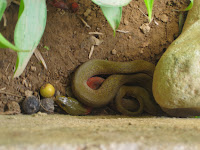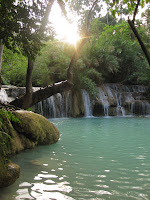I'm sitting on the balcony of the hut, looking at a man and his family who arrived at the riverside, carrying a rice sack tied at the top. The man lit a fire then, when it was blazing, he opened the sack and tipped out a dead dog and began singeing its fur in the fire, beating at the burning hair with a switch of green leaves. Now they're skinning and cleaning the carcass in the river, and I'm waiting to see whether they plan to cook it here over the embers.
We've been in Tad Lo for a week now, losing track of the time, losing track of the days. Yesterday we drove across the Bolaven Plateau to Sekong, and a little further to Tad Feake, another beautiful set of falls where water washes the black rocks before spreading in deep pools where locals swim and plunge from the rocks. We drove back through Thateng, where a few days before we'd stopped to watch one half of a football match. The local team, dressed in Liverpool jerseys, and on average a good six inches taller than their opponents, were clearly the superior force, but both teams played committed, physical football in the dust and heat. Each time the ball struck the baked brown earth an explosion of orange obscured the air, and hundreds of heads weaved to follow the ball as it emerged from the smoky clouds kicked up by the worn football boots.
The family at the riverside just left, carrying the dog carcass, its innards in a large steel bowl which a young boy carried with care up the steps beside the hut. In a few days, at full moon, there is a celebration in the nearest village, Khiantenglae, where there will be a buffalo sacrificed in honour of the local Gods. Mama Pap, from whom we have been trying to elicit information about the time and date of the festival, is going to take us there to witness the ceremony. She speaks Lao and Thai, and a little French and English, but hardly any Jarai, the language of the village only one kilometre away. We were there a few days ago, and a boy asked us for a pen. Sam gave him hers and he walked off happily drawing on his hand. We bought boxes of pencils and copybooks to bring with us next time. I guess it was a boy from one of the villages where little Lao is spoken who returned our greeting with a careless laugh as he said 'No Sabaidee' over his shoulder.
Perhaps it's the timeless routine of village life that seems to distort temporal perception here in Tad Lo. Every morning for perhaps hundreds of years, women have come to these river banks to wash their children, the family's clothes, and to bathe. Every evening young men gather on the falls to fish from the rocks with bamboo rods, with nets and spears, and to jump from the cliffs and swim. Along the river banks are farmers washing their buffalo, women washing their hair, and children playing. In the middle of the shallow river, men and women with nets dredge up mud and weeds, and pick through it looking for shellfish and eels to bring home. In the early darkness boys hunt for frogs in the damp grass.
The young girl who came to investigate the sound of the whistle the other day just returned with her friend when she heard the music again. She was looking through my pencil case and playing with the pens while her friend blew shrill, shrieking noises from the whistle. I got a pencil and a copybook for each of them, and they immediately sat down to write their names on the first page. They were delighted with their little gifts, and disappeared, saying 'Thank you', and 'Bye bye', slapping high-fives, and even bumping fists. I expected more children to return, and the first of what I guess may be many visitors has just arrived, and the balcony is crowded with happy children munching oranges and playing games that I
can't begin to understand.





































